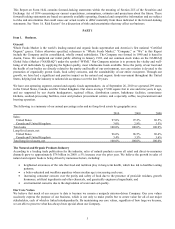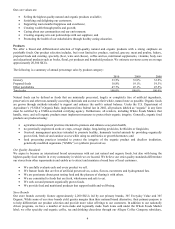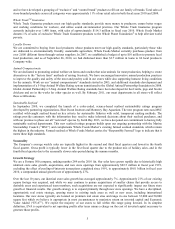Whole Foods 2010 Annual Report Download - page 19
Download and view the complete annual report
Please find page 19 of the 2010 Whole Foods annual report below. You can navigate through the pages in the report by either clicking on the pages listed below, or by using the keyword search tool below to find specific information within the annual report. 13
Supplier Concentration Risk
UNFI is our single largest third-party supplier, accounting for approximately 27% of our total purchases in fiscal year 2010.
During fiscal year 2010, we extended our long-term relationship with UNFI as our primary supplier of dry grocery and
frozen food products through 2020 and added two of our regions to our distribution arrangement beginning in fiscal year
2011. Due to this concentration of purchases from a single third-party supplier, the cancellation of our distribution
arrangement or the disruption, delay or inability of UNFI to deliver product to our stores may materially and adversely affect
our business, financial condition or results of operations while we establish alternative distribution channels.
Widespread Health Epidemic
The Company’s business could be severely impacted by a widespread regional, national or global health epidemic. Our
stores are a place where customers come together, interact and learn while at the same time discovering the many joys of
eating and sharing food. A widespread health epidemic may cause customers to avoid public gathering places or otherwise
change their shopping behaviors. Additionally, a widespread health epidemic could also adversely impact our business by
disrupting production and delivery of products to our stores and by impacting our ability to appropriately staff our stores.
Indebtedness
As of November 19, 2010, we had $390 million remaining on our term loan maturing August 28, 2012 and we may incur
additional debt in the future. A significant portion of our future cash flow from operating activities may be dedicated to the
repayment on our indebtedness. Our indebtedness could limit our ability to obtain additional financing for working capital,
capital expenditures, debt service requirements, acquisitions or other purposes in the future. There is no guarantee that we
will be able to meet our debt service obligations. If we are unable to generate sufficient cash flow to meet our debt service
obligations, we may be required to seek additional financing in the debt or equity markets, refinance or restructure all or a
portion of our indebtedness, sell selected assets or reduce or delay planned capital or operating expenditures. If we fail to
comply with our debt covenants, we will be in default, in which case there can be no assurance that we would be able to cure
the default, receive waivers from our lenders, amend the loan agreements or refinance the debt.
Labor Relations
All of our team members are non-union, and we consider our team member relations to be very good. From time to time,
however, unions have attempted to organize all or part of our team member base at certain stores and non-retail facilities.
Responding to such organization attempts is distracting to management and team members and may have a negative financial
impact on a store, facility or the Company as a whole.
Governmental Regulation
The Company is subject to various international, federal, state and local laws, regulations and administrative practices
affecting our business, and we must comply with provisions regulating health and sanitation standards, food labeling, equal
employment, minimum wages, and licensing for the sale of food and, in some stores, alcoholic beverages. Our new store
openings could be delayed or prevented or our existing stores could be impacted by difficulties or failures in our ability to
obtain or maintain required approvals or licenses. Changes in existing laws or implementation of new laws, regulations and
practices (e.g., health care reform and/or card check legislation) could have a significant impact on our business.
The USDA’s Organic Rule facilitates interstate commerce and the marketing of organically produced food and provides
assurance to our customers that such products meet consistent, uniform standards. Compliance with this rule could pose a
significant burden on some of our suppliers, which may cause a disruption in some of our product offerings.
We cannot predict the nature of future laws, regulations, interpretations or applications, or determine what effect either
additional government regulations or administrative orders, when and if promulgated, or disparate federal, state and local
regulatory schemes would have on our business in the future. They could, however, require the reformulation of certain
products to meet new standards, the recall or discontinuance of certain products not able to be reformulated, additional
record keeping, expanded documentation of the properties of certain products, expanded or different labeling and/or
scientific substantiation. Any or all of such requirements could have an adverse effect on our results of operations and
financial condition.
International Operations
Though only 3.0% of our total sales in fiscal year 2010, the Company’s international operations are subject to certain risks of
conducting business abroad, including fluctuations in foreign currency exchange rates, changes in regulatory requirements,
and changes or uncertainties in the economic, social and political conditions in the Company’s geographic areas, among
other things.
























